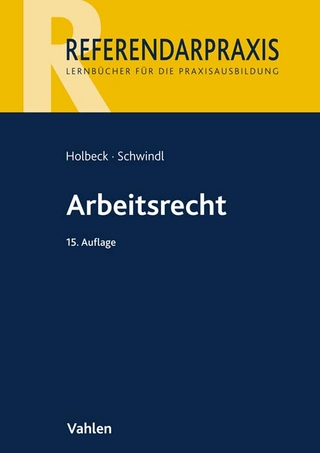
Collective Bargaining and the Gig Economy
Hart Publishing (Verlag)
978-1-5099-5623-4 (ISBN)
Despite the variety of situations covered by the term “gig economy”, collective agreements for employees and non-employees are being concluded in various countries, either at company or at branch level. Offline workers such as riders, food deliverers, drivers or providers of cleaning services are slowly gaining access to the series of negotiated rights that, in the past, were only available to employees.
The chapters analyse recent high-profile decisions including Uber in France’s Court de Cassation, Glovo in the Spanish Supreme Court, and Uber in the UK Supreme Court. They evaluate the bargaining agents in different Member States of the EU, to determine whether established actors are participating in the dynamics of the gig economy or if they are being substituted, totally or partially, by new agents. Interesting best practices are drawn from the comparison, also as regards the contents of collective bargaining, raising awareness in those countries that are being left behind in the dynamics of the gig economy.
The book collects the results of the COGENS (VS/2019/0084) research project, funded by the European Union, that gathered scholars and stakeholders from 17 countries. It will be an invaluable resource for scholars, trade unionists and policy makers.
The eBook editions of this book are available open access under a CC BY-NC-ND 4.0 licence on bloomsburycollections.com.
José María Miranda Boto is Associate Professor in Labour Law at the University of Santiago de Compostela, Spain. Elisabeth Brameshuber is Professor of Labour and Social Security Law at the University of Vienna, Austria.
Introduction
Jose Maria Miranda Boto University of Santiago de Compostela, Spain and Elisabeth Brameshuber, University of Vienna, Austria
1. Collective Bargaining and the Gig Economy: Reality and Possibilities
Jose Maria Miranda Boto University of Santiago de Compostela, Spain
PART I
THE SOURCES OF A POSSIBLE REGULATION
2. The Boundaries between Collective Agreements and Statutory Legislation in the Gig Economy
Piera Loi, University of Cagliari, Italy
3. A Long Road Towards the Regulation of Platform Work in the EU
Luca Ratti, University of Luxembourg
4. Collective Bargaining for Platform Workers and the European Social Charter
Barbara Kresal, University of Ljubljana, Slovenia
5. The Role of National Courts in Protecting Platform Workers: A Comparative Analysis
Jeremias Adams-Prassl, University of Oxford, UK, Sylvaine Laulom, University Lumière Lyon 2, France and Yolanda Maneiro Vazquez, University of Santiago de Compostela, Spain
6. Why Collective Bargaining is a ‘Must’ for Platform Workers and How to Achieve it
Tamas Gyulavari, Peter Pázmány Catholic University of Budapest, Hungary and Gábor Kártyás, Peter Pázmány Catholic University of Budapest, Hungary
7. Voluntary Commitments as Alternative Instruments for Standard-Setting? The Example of the German ‘Code of Conduct – Paid Crowdsourcing for the Better’
Judith Brockmann, HAW Hamburg, Germany
PART II
ACTORS AND CONTENTS
8. The ‘Smart’ Trade Union: New Strategies for a Digitalised Labour Market
Felicia Rosioru, Babes-Bolyai University, Romania
9. Algorithms, Discrimination and Collective Bargaining
Teresa Coelho Moreira, University of Minho, Portugal
10. Protection of Gig Workers against Contract Termination: Not for Everyone?
Jakub Tomšej, Charles University of Prague, Czech Republic
11. The Personal Dimension of Collective Bargaining in the Gig Economy: The Spanish Perspective
Daniel Perez del Prado, University Carlos III de Madrid, Spain
12. The Shortcomings of the North American Collective Bargaining Model with Regard to Platform Workers: The Turkish Perspective
Kubra Dogan Yenisey, Bilgi University of Istanbul, Turkey
13. Extending the Personal Scope of Collective Bargaining as a Chance for Gig Workers? The Polish Case
Marta Kozak-Masnicka, University of Warsaw, Poland and Lukasz Pisarczyk, University of Warsaw, Poland
14. (A Fundamental Right to) Collective Bargaining for Economically Dependent, Employee-Like Workers
Elisabeth Brameshuber, University of Vienna, Austria
| Erscheinungsdatum | 13.05.2022 |
|---|---|
| Verlagsort | Oxford |
| Sprache | englisch |
| Maße | 156 x 234 mm |
| Themenwelt | Recht / Steuern ► Arbeits- / Sozialrecht ► Arbeitsrecht |
| Recht / Steuern ► EU / Internationales Recht | |
| Recht / Steuern ► Öffentliches Recht | |
| Recht / Steuern ► Privatrecht / Bürgerliches Recht ► IT-Recht | |
| Recht / Steuern ► Wirtschaftsrecht ► Wettbewerbsrecht | |
| ISBN-10 | 1-5099-5623-9 / 1509956239 |
| ISBN-13 | 978-1-5099-5623-4 / 9781509956234 |
| Zustand | Neuware |
| Informationen gemäß Produktsicherheitsverordnung (GPSR) | |
| Haben Sie eine Frage zum Produkt? |
aus dem Bereich


